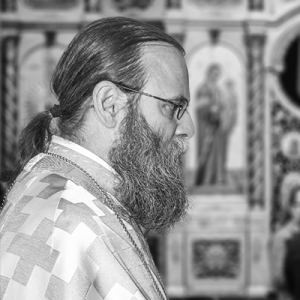“Walking the Talk” — Prayer
— Fr. Bohdan Hladio
July, 2008 A.D.
If we believe in God, follow the teaching of Jesus Christ, and desire to live a life of love, we will pray.
Prayer is essentially communication or communion with God. As St. Seraphim of Sarov says
“Truly, in prayer we are vouchsafed to converse with Him, our All-Gracious and Life-Giving God and Saviour…”.
Prayer has many forms. St. Paul writes “I exhort therefore first of all that supplications, prayers, intercessions, thanksgivings be made” (1 Tim. 2:1). St. John Cassian explains these various aspects of prayer as follows:
“Supplication is an imploring or petition concerning sins, in which one who is sorry for his present or past deeds asks for pardon. Prayers are a vow to God… We pray when we renounce this world, we pray when we promise that… we will cleave to the Lord in all sorrow of heart and humility of spirit. We pray when we promise that we will ever maintain the most perfect purity of body and steadfast patience, root out of our heart anger or sorrow that works death. Intercessions are prayers for others also, making requests either for those dear to us or for peace. Thanksgiving is for past benefits, present ones or future, which God has prepared for those who love Him.”
Prayer is the most important activity of every true Christian. St. Seraphim goes on to say:
“…every good work done for the sake of Christ gives us the grace of the Holy Spirit, but prayer provides it most of all, for prayer is, as it were, always at hand as an instrument for the acquisition of the grace of the Spirit. For instance, you would like to go to Church, but either there is no church or the service is over. Or, you would like to give alms to a beggar, but there is not beggar or you have nothing to give… Or, you would like to do some good deed or other for Christ’s sake, but you have not the strength or the occasion does not arise. But nothing stands in the way of prayer. It is always possible for everyone, rich and poor, noble and lowly, strong and weak, healthy and sick, righteous and sinful… Great is the power of prayer. More than anything else it brings with it the Spirit of God, and its practice is available to everyone…”
Nothing worthwhile in this life is achieved without discipline and hard work. Prayer is no exception. Every serious Christian will have a rule of prayer which usually includes both formal and informal ways of praying.
Formal prayer consists of saying “set” prayers in a particular order, such as those found in a prayer book. These usually include morning prayers, evening prayers, and mealtime prayers. The important point regarding formal prayer is faithfulness. We must commit a certain amount of time every morning and every evening to saying our prayers. It is better to say a few prayers slowly and attentively than to say many prayers quickly and inattentively. Approached in this manner even 10 minutes every morning and evening can contribute to great spiritual growth and a deeper relationship with God.
Informal prayer generally consists of a short phrase which is repeated while engaged in daily tasks. The most well-known prayer in this regard is the “Jesus Prayer” – “Lord, Jesus Christ, Son of God, have mercy on me, the sinner.” Other such prayers might include verses from the psalms (e.g. ”I will love You, O Lord, my strength…” [Ps. 17]) or appeals to the saints (e.g. “Holy Saint. . . pray to God for me!”). Simply talking to God in one’s own words as to a dear friend – the example of Tevye in Fiddler on the Roof comes immediately to mind – is always to be encouraged.
In addition to the above, just spending quiet time alone with God every day is beneficial. Each of us should set aside fifteen minutes or a half-hour every day to sit alone in silence before the icons, putting ourselves in God’s presence, opening our hearts and minds to Him. As noted by one of the fathers of the Church, “silence is the sacrament of the world to come, while speech is the tool of this world.”
Genuine prayer is characterized by attention, sincerity, and love.
The devil hates nothing as much as he hates prayer. When we try to pray, he tries to divert our attention. When, while praying, our mind wanders, we must strive to bring our attention back to God.
Likewise, we must pray sincerely. Saying “forgive us our trespasses as we forgive those who trespass against us” when we don’t forgive others is simply dishonest. God sees the heart. Such a prayer will not be unto salvation, but unto judgment and condemnation.
Most importantly our prayer must be motivated and energized by love – love for God and neighbour. Love is both the inspiration and the consummation of prayer.
Ultimately God isn’t interested in people who follow rules, but in people who love Him and each other. We live in accordance with God’s law because this is the way we show our love for God: “If you love me, keep my commandments” (Jn. 14:15). The Gospel shows that Jesus both prayed and expected his disciples to pray. If we truly are His disciples prayer will be a vital and integral part of our daily life.

